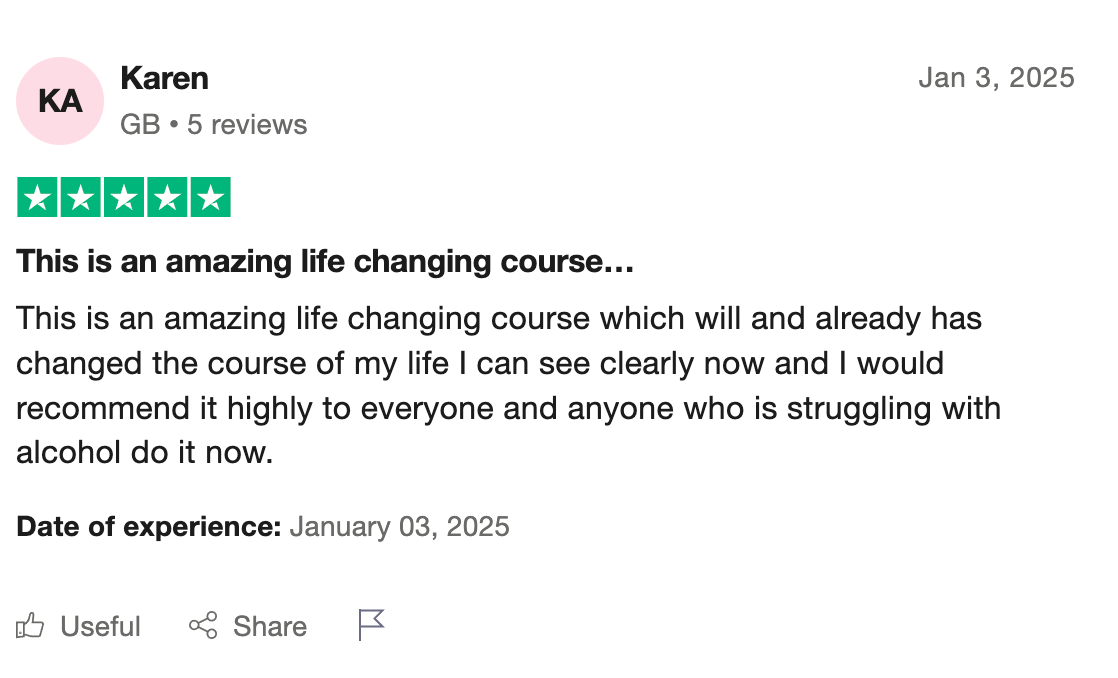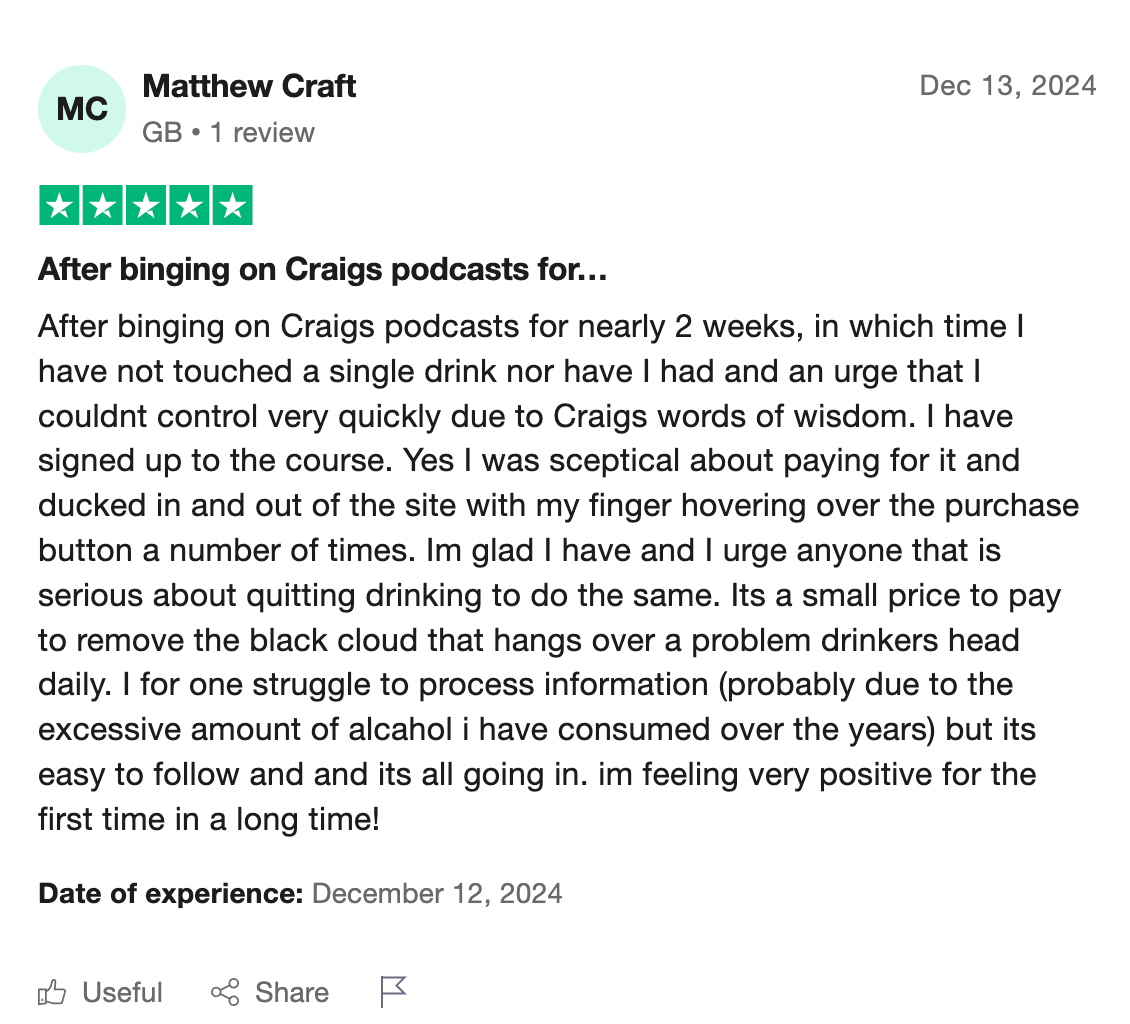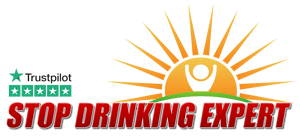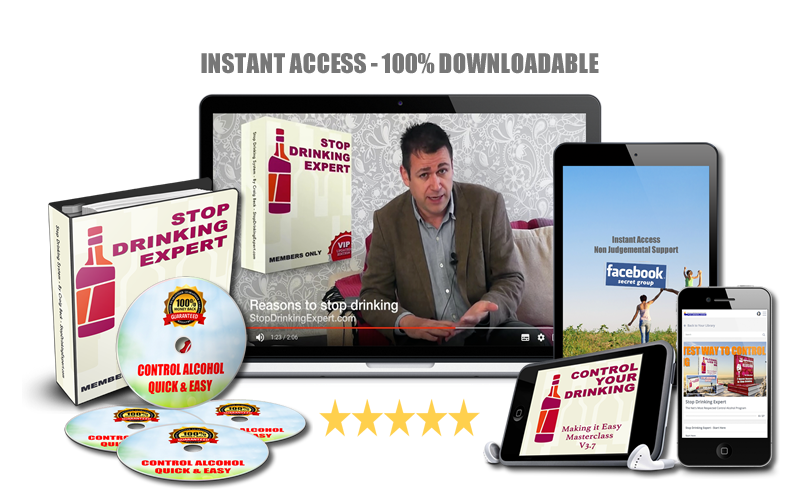Staying Sober Is Not Something You Need To Do Alone – Getting Help Is Good

Staying Sober Is Not Something You Need To Do Alone – Get Help
Stopping drinking can feel like climbing a cliff with oiled boots. You see friends toasting at the pub and Instagram brims with cocktails. Meanwhile your morning mirror reflects eyes and regret. The thought of staying sober alone tightens your chest and you postpone action. Today we will explore why companionship beats isolation and how reaching for help speeds the journey. Freedom loves company. Download a free copy of Alcohol Lied To Me and start now.
Addiction loves secrecy. It thrives in dim kitchens at midnight when the fridge light flickers on the first pour. Your mind whispers that nobody will understand because nobody feels the exact mix of shame and craving you feel. That lie keeps you shackled. Neuroscientists explain that isolation starves the prefrontal cortex of social feedback so decision making skews toward impulse. Translation: being alone makes reaching for the bottle easier than reaching for recovery.
Contrast that with the warmth of a group who nod knowingly while you speak. Oxytocin releases during honest conversation and that chemical glow lowers stress and lifts mood. Suddenly cravings lose volume like a radio dialled down. When you join our private Stop Drinking Expert forum you witness strangers swapping memes recipes and midnight encouragement. Soon enough they are not strangers. Community becomes a soft safety net ready to catch wobbles before they spiral.
Yet many people keep their battle hidden. Jenny a teacher from Leeds told me she feared colleagues would gossip if they spotted her in a support meeting. She tried white knuckle abstinence alone for three months then collapsed at a school reunion. Her story illustrates a simple truth: secrecy breeds pressure pressure sparks relapse. By contrast transparency shrinks the monster because you expose it to sunlight and monsters hate bright light.
Why Solitary Willpower Fails
Willpower works like a phone battery. It starts strong in the morning yet drains with every decision from emails to traffic jams. Alcohol dependency adds heavy background apps that chew through remaining charge. Eventually the screen goes black and you pour a drink. Friends mentors and structured programs act like portable chargers. They help you reboot before blackout. This practical metaphor resonates because everyone has felt the dread of a dead phone at night.
Researchers at Stanford tracked recovering drinkers who integrated social accountability into daily routines. After twelve months seventy percent maintained sobriety compared to thirty percent who went solo. The numbers speak louder than slogans. Accountability can mean texting a coach at sunset or posting a craving scale in the forum. Small gestures create psychological contracts. When you announce your intention you invite witnesses and that simple invitation transforms flimsy aims into resilient commitments.
Technology offers sleek tools yet flesh and blood faces still matter. A handshake triggers neural mirroring. Shared laughter releases endorphins that rival chocolate. During the Stop Drinking Expert live Zoom sessions cameras light up living rooms from Melbourne to Miami. Someone cracks a dad joke about seltzer and the entire grid smiles. That shared grin proves you belong. Belonging soothes nervous systems and a calm nervous system cuts relapse risk.
Do not underestimate professional guidance. Therapists and coaches study cognitive behavioural strategies that dismantle cravings faster than sheer grit. They notice thought distortions you consider normal. For instance you might claim a colleague drove you to drink. A skilled mentor will politely challenge that narrative then offer healthier coping scripts. Guidance is not looming authority it is a seasoned climbing partner handing you a rope when the path narrows above a canyon.
The Myth of Self Reliance
Popular culture worships the lone wolf who claws to the summit through raw determination. While that tale thrills at the cinema it makes awful health advice. Humans evolved in tribes and our biology still expects campfire circles not solitary caves. When a tribe surrounds you the vagus nerve signals safety and digestion improves. That calm foundation frees mental bandwidth to plan meals practise mindfulness and complete alcohol free challenges with conviction.
I once met Carl a Boston firefighter who prided himself on being the rock for everyone else. He hid his whisky habit until tremors betrayed him during a station drill. Opening up felt like ripping armour yet his crew responded with quiet respect and daily coffee check ins. Within weeks Carl joined a peer program and his intake plummeted. Support did not weaken him. It fortified the courage he already owned.
Your support circle can be unconventional. Maybe your aunt loves gardening and invites you to dig potatoes on trigger evenings. Physical labour plus earthy humor can smother urges. Others bond with virtual avatars while gaming. If you worry that drinking alone has set you apart community will prove otherwise. You give attention you recieve encouragement. That exchange sparks dopaminergic joy that competes directly with alcohol’s chemical payoff.
Even moments of silence shared with another person reduce cortisol. Consider attending a local library lecture on Thursday nights simply to sit among curious minds. You need not announce your recovery. The mere proximity dulls loneliness which scientists rank as lethal as smoking. Loneliness magnifies self blame and blurs future thinking. A crowded reading room might look dull yet it quietly patches those cognitive holes and patched holes leak fewer resolutions.
Building Your Personal Sober Squad
Start by mapping people you trust on paper. Include cousins old school friends and that upbeat colleague who never judges. Rank them by availability and empathy then pick two to contact tonight. A simple text can read I am cutting alcohol could use some cheer occasionally hope that is okay. Direct words avoid confusion. Most recipients will reply with encouraging emojis. A few may ignore you. That is useful data not catastrophe.
Next widen the net toward structured groups. Alcoholics Anonymous suits some personalities. Smart Recovery emphasises skills. If you prefer learning explore our guide on how to stop drinking without rehab. The Stop Drinking Expert webinar melds education with humour and you can attend from your sofa wrapped in a blanket. Experiment until the fit feels snug like your trainers. Variety counters boredom because monotony provokes cravings. Think of it as cross training for the brain.
Digital tools complement flesh interactions. Download craving tracker apps that ping you hourly and prompt a breath exercise. Pair the app with a find sober friends WhatsApp chain of allies. When the urge shouts you type a quick SOS. Responses flood in with memes voice notes and sometimes stern reminders. Those pings create a reality check faster than your imagination can craft excuses. Technology once lured you toward night deliveries it can shepherd you away.
Remember also to involve healthcare professionals. A physician can monitor liver enzymes and adjust medications that might interact with new sobriety. Discuss options like naltrexone or acamprosate rather than guessing dosage in online forums. Medical oversight feels formal yet it protects both body and mind. Regular blood results offer tangible proof of progress and that data motivates more than vague feelings. Nothing beats seeing gamma GT numbers slide downward like a ski slope.
Navigating Resistance from Others
Not everyone will applaud your decision. Drinking buddies may tease saying you are no fun. Family might push wine at Sunday roast believing moderation is harmless. Prepare polite scripts in advance. You can wink and say Doctor’s orders or simply hold your sparkling water as though it were a majestic goblet. Most people drop the issue when they sense confidence. If they persist remember their discomfort belongs to them not to you.
Sometimes resistance hides inside your own flat. A partner who still drinks may feel threatened by the mirror your sobriety holds up. Approach with empathy not accusation. Share your reasons and invite participation without demand. Suggest alcohol free date nights with exotic mocktails and old vinyl records. Celebrate shared mornings free from pounding heads. Gradual exposure often converts sceptics because they experience benefits first hand rather than hearing lectures.
Office culture can pose another minefield. The Friday pint ritual may feel compulsory. Begin by recruiting one colleague who also wants clear mornings. You two can start a tradition of espresso walks at four. Over time others may join and the old ritual shrinks. If that fails schedule your annual leave to dodge heavy celebrations until confidence grows. Strategic avoidance is practical not cowardly pilots avoid storms rather than flying straight through.
Do not forget digital resistance. Social media feeds show friends sipping prosecco on rooftops under lavender sunsets. Unfollow triggers temporarily and fill the timeline with hiking dogs and pastry art. Algorithms mimic your choices so curate wisely. Join sober hashtags where victories get virtual confetti. Online environment matters because the brain only partly distinguishes screen images from real life scenes. Feed it images that support rather than sabotage your promise.
Celebrate Progress Together
Milestones deserve ceremony. Not everyone fancies chips at an old fashioned chip shop yet most love acknowledgement. Mark your first alcohol free week with sunrise on the nearest hill and a flask of rich coffee. Bring a friend and take silly photos. Post them to our forum so newcomers witness real faces enjoying real freedom. Celebration solidifies memory pathways. The limbic system stores victory snapshots and later retrieves them to counteract seductive flashbacks.
Plan bigger rituals for monthly anniversaries. Perhaps cook a feast of Thai dishes with culinary curiosity. Spice tingles taste buds dulled by years of ethanol. Invite neighbours even if they still drink and flaunt your mocktail topped with mint. When they praise the flavour you strengthen resolve and they glimpse the benefits of quitting drinking. Sharing food mirrors ancient bonding practices across cultures and communal eating boosts serotonin. A party can outshine any bar crawl.
Give back as you grow. Mentor a newcomer who frets about sleeping without wine. Share the breathing drill that saved you on Tuesday night. Generosity activates the helper’s high which floods circuits with dopamine oxytocin and endogenous cannabinoids. That neurochemical cocktail feels cleaner than any shot of tequila. Service also reminds you of earlier struggles preventing complacency. In this way the community sustains itself like an ecosystem where each plant feeds another.
Before you close this tab breathe and picture life twelve months from today. Clear mornings crackle with possibility. Your wallet stops haemorrhaging cash at corner shops and your skin glows with fresh colour. Those scenes are not fantasy. They are documented outcomes reported by thousands who used the Stop Drinking Expert method. Download your complimentary copy of Alcohol Lied To Me and step onto a well trodden path you do not need to walk alone.
Remember sobriety is less a destination than a road trip. Some days feel like motorway cruise others resemble winding Cornish lanes yet the scenery keeps widening. Friends in your convoy honk when motivation dips and share sandwiches at rest stops. You only need to grip the wheel and keep rolling. If you stall the gang will push start the engine. That is the magic of collective momentum it converts breakdowns into stories.
References
- Kelly JF, Greene MC. The benefits of peer support for individuals in recovery. Journal of Substance Abuse Treatment. 2018.
- Holt-Lunstad J, Smith TB, Layton JB. Social relationships and mortality risk. PLoS Medicine. 2010.
- Miller WR, Rollnick S. Motivational Interviewing Helping People Change. Guilford Press. 2013.
- Bohnert KM, Ilgen MA. Understanding links among opioid use pain and suicidality. Drug and Alcohol Dependence. 2019.
More to Explore
- The Dutch Courage Myth Explained
- Hidden Signs of Alcohol Abuse
- Why Quitting Drinking Is Good News
- High Functioning Alcoholism Unmasked
- What to Expect When You Give Up Alcohol
Does this sound familiar?
- Drinking to escape stress and to cope with the pressures of life?
- Waking up full of guilt and regret that you drank again last night despite promising that you wouldn't?
- Hiding alcohol or the evidence of your drinking?
- Feeling like you are living a double life because of your drinking?
- Creating silly rules to try and control your drinking (e.g., I will only drink on special occasions)?
The good news is that you are not alone; the better news is that I can help.
Meet Craig Beck, The World's Most Respected Sobriety Coach
Craig Beck, better known as “The Stop Drinking Expert”, turned a 20-year battle with alcohol into a roadmap for lasting freedom. The bestselling author of Alcohol Lied to Me and The Sobriety Secret discovered that traditional routes like Alcoholics Anonymous can feel embarrassing, public, and all too often, entirely ineffective.
His method is different. It shows you:
- Why you drink in the first place—the hidden brain loops alcohol hijacks.
- How to switch off cravings before they even start.
- A willpower-free exit plan you can follow privately, at your own pace—no labels, no awkward meetings, no medication.
Hundreds of thousands worldwide now wake up clear-headed, proud and at peace thanks to Craig’s approach. Will you be the next?
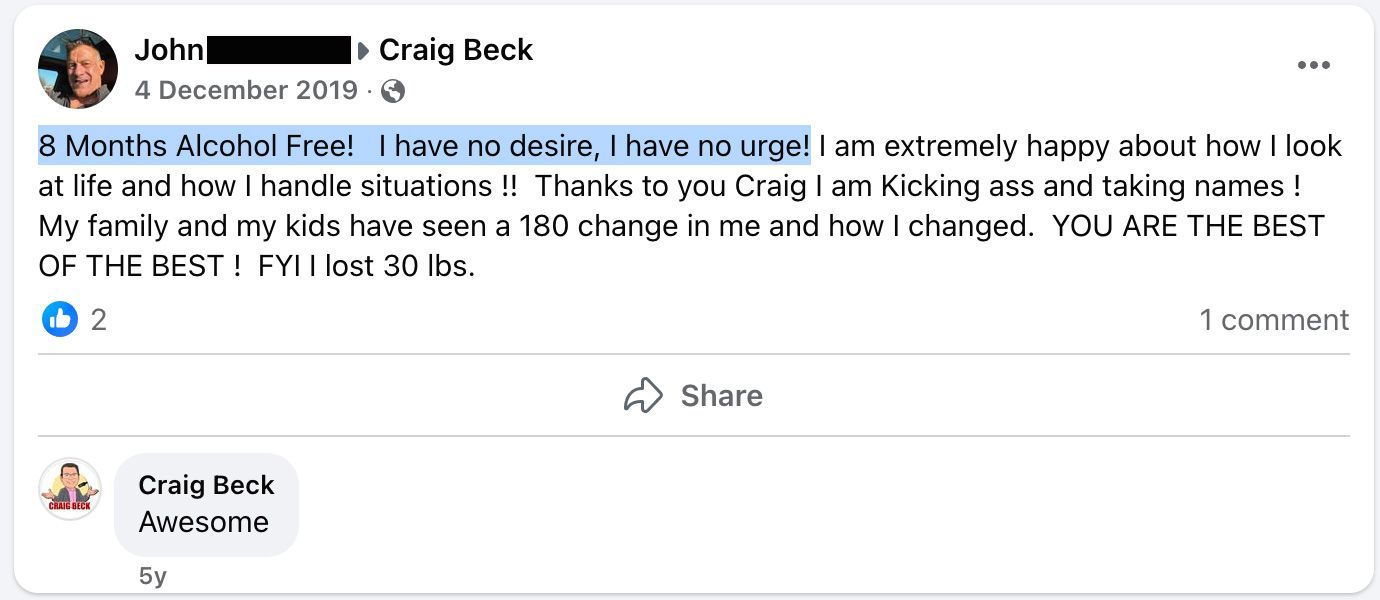
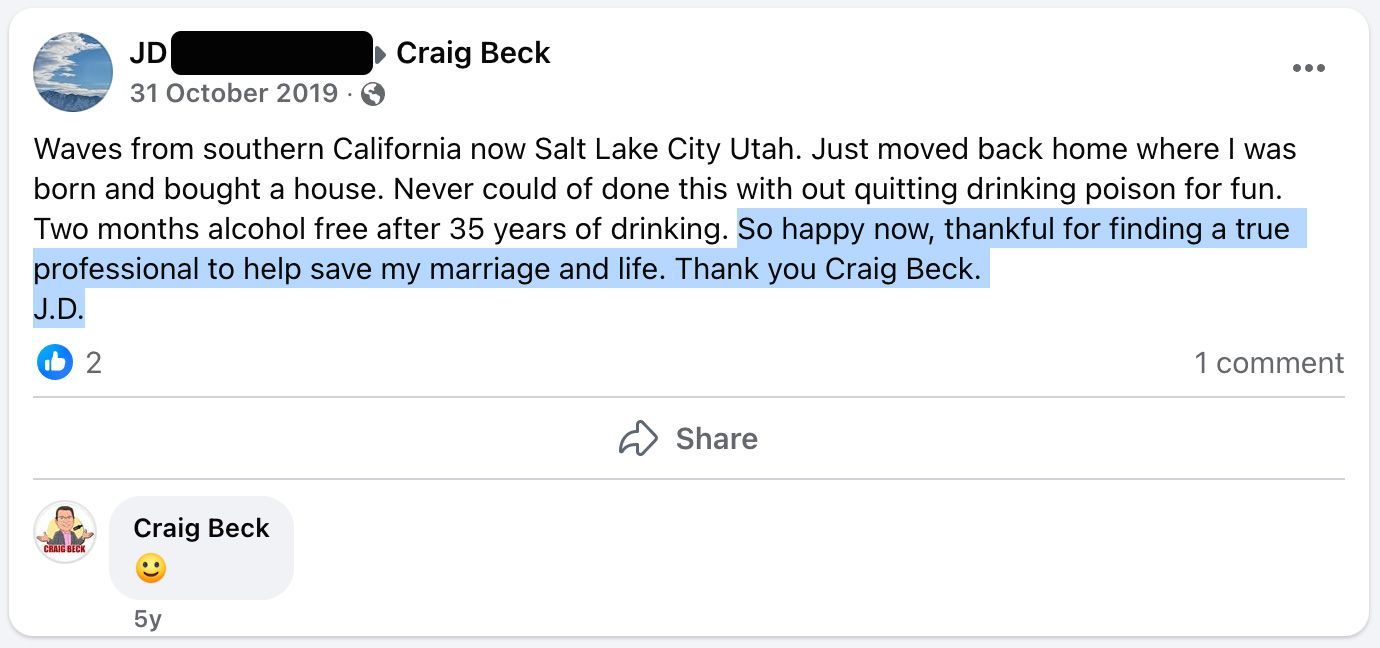
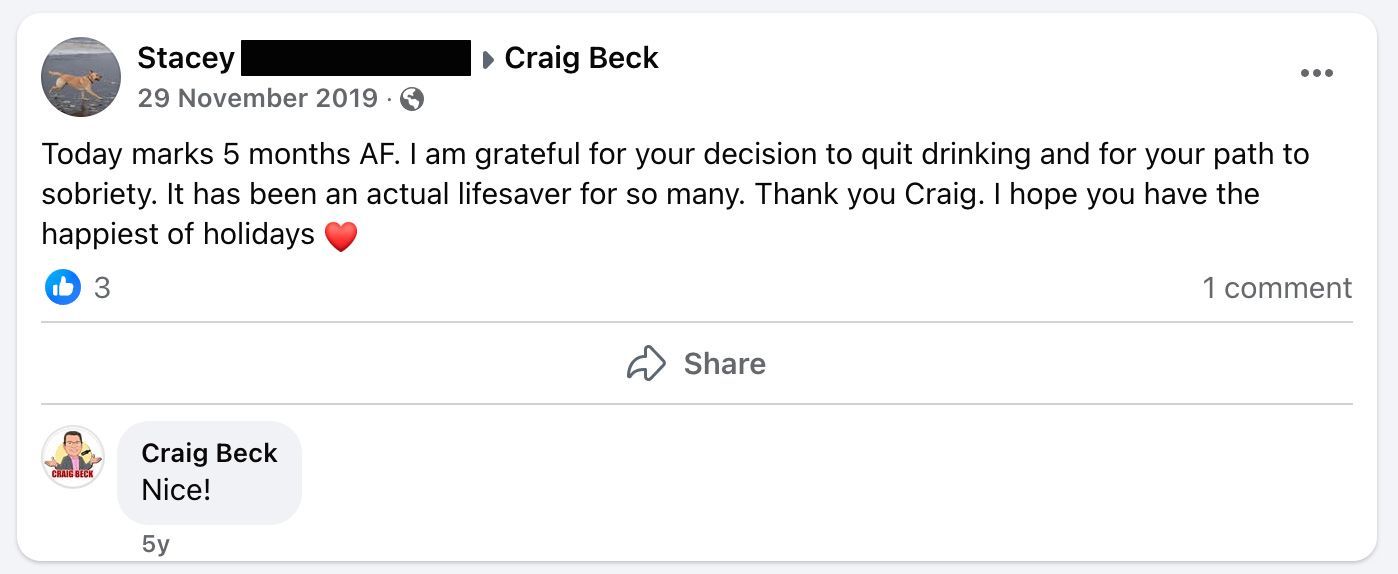
"Effortless Sobriety: The Proven Path to End Problem Drinking"
No one likes asking for help with their drinking—it feels personal and heavy. But if willpower alone hasn’t worked, it’s not because you’re weak. Research indicates that relying solely on grit is unsuccessful approximately 95 percent of the time. You’ve simply been using the wrong tool for the job.
Download my free ebook or decide now get started with the full course and learn:
- Why the game is rigged: how alcohol rewires your brain chemistry and makes “just trying harder” almost impossible.
- A science-based exit plan: practical steps that work quickly, privately, and on your terms.
- No awkward meetings or risky meds: forget the gimmicks—this is about smart strategy, not shame.
`Are you ready to step onto solid ground? Get off the fence, take action, and start taking back control—quickly, confidently, and without the struggle.
Over 250,000 Happy Sober Clients Can't Be Wrong:






